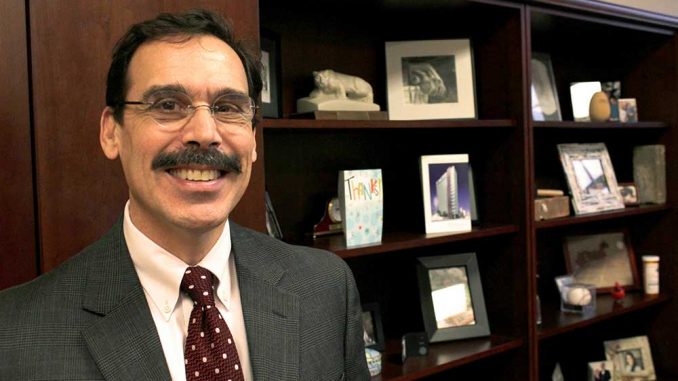

After a lagging economy caused family incomes to stagnate and university state appropriations to level, administrators began to think about changes to counteract these downturns.
“Increasingly along the way we were asking, ‘What are fundamental changes that we can make to help us be more efficient, but without sacrificing excellence?’” said Executive Vice President, Chief Financial Officer and Treasurer Anthony Wagner.
That’s when officials started to view decentralized budgeting as a budget model that could be suited for Temple. A decentralized budget allocates funds to schools and colleges and gives power to the deans, instead of the current model which largely keeps resources in the center of the university.
“It’s really about creating a polarity, so that you have both strong decentralized operating units, but a strong central administration that’s helping to coordinate and guide the work and activities of those units,” Wagner said.
While the university has been looking into the idea for a few years, it appointed a steering committee last year to seriously explore whether the model could fit at Temple. Members of the committee, made up of financial officers, staff, administrators and deans, traveled to Indiana University for two days in December to learn about how Indiana uses their decentralized budget model — called Responsibility Centered Management.
Temple has been working with Indiana Bloomington’s Director of Budget and Planning Aimee Heeter and now-retired Senior Associate Vice President Doug Priest throughout the process, but from going to Indiana, members of the steering committee were able to meet with about 30 people from Indiana who are involved with the various aspects of RCM.
When Wagner returned from Indiana, he said the most important thing he took from the trip was the “entrepreneurial spirit that runs through the entire university.” While he said Temple has that spirit, he hopes a new budget model will bring more to the university.
“Quite frankly, it was a fundamentally different mindset in that regard,” Wagner said. “Decentralized budgeting will help us institutionalize that here and reward strong program and financial management by schools and colleges.”
Though the redesigned budget is not coming to Temple specifically because of President Neil Theobald, who was Indiana’s senior vice president and chief financial officer and worked with RCM for 20 years, the choice of Theobald allows Temple to use a person who university officials called an expert in this subject matter. Senior Associate Vice President for Finance and Human Resources Ken Kaiser told The Temple News in December that the hiring of Theobald “boosted our ability to do this right.”
Theobald, who said he’s met with deans and faculty about the restructured budget, said the budget allows funds to be used more efficiently by giving schools the ability to spend on what is important to those particular programs.
“My knowledge of what is really needed in the school of engineering, and the school of business and the school of law is obviously pretty limited because I’m a long way away,” Theobald said. “The deans of those schools and the faculty of those schools are in the position to know how to most effectively spend funds. It has a logic to it that I think resonates with people.”
Deans responded positively to the idea of the budget, Theobald said, although he warned that with increased freedom to spend on specific needs, comes increased responsibility.
“They’re held accountable, there’s two sides to that,” Theobald said. “While they make the decisions and have the authority, they also have the responsibility.”
One potential issue with the model is that it could pit schools and colleges against each other, which is something Wagner said the administration is working to avoid.
“That’s something that we don’t want to do,” Wagner said. “What we want to do is exactly the opposite. We want to create incentives in the model that encourage deans to collaborate, not to compete.”
Wagner added that from working with Heeter and Priest, administrators have been able to learn from issues Indiana has had in the past with the program and avoid those when the model is implemented at Temple.
“We have the benefit of being able to learn from their mistakes,” Wagner said. “One of the things that happens regularly in our discussions with Doug Priest and Aimee Heeter is that they’ll say, ‘This is the way we’ve done it at IU, but if we could go back to the beginning, this might be a better way to go about it.’”
A decentralized budget will be run parallel to the current budget model in fiscal year 2013-14 to show deans what their budgets would look like under the plan. The following year, fiscal year 2014-15, the plan would go live but would leave some room for error for deans.
“We would essentially have a hold-harmless [policy] that year meaning the deans would know what their budgets would be under decentralized budgeting, but there’s no fiscal cliff,” Wagner said. “The following year, which is ‘16, is when it’s truly live and the training wheels are off and you’re managing with whatever resources are under that.”
Temple has been slowly implementing traits of the decentralized model into some summer sessions and other academic programs in order to ease the transition, Wagner said.
Administrators have not set how funds will be allocated under the plan, but Wagner said it will most likely be tied to credit hours within schools, but may include a further breakdown based on credit hour and major.
“If the College of Engineering teaches a course, they get the tuition for that course, for all of the people taking that course, those credit hours,” Wagner said. “Those methodologies spread the revenue across the universities and it finds its home wherever the actual teaching is occurring.”
Though the administration is working to implement this budget model it needs to be formally approved by the Board of Trustees in order to go live, Wagner said.
Sean Carlin can be reached at sean.carlin@temple.edu or on Twitter @SeanCarlin84.


Be the first to comment